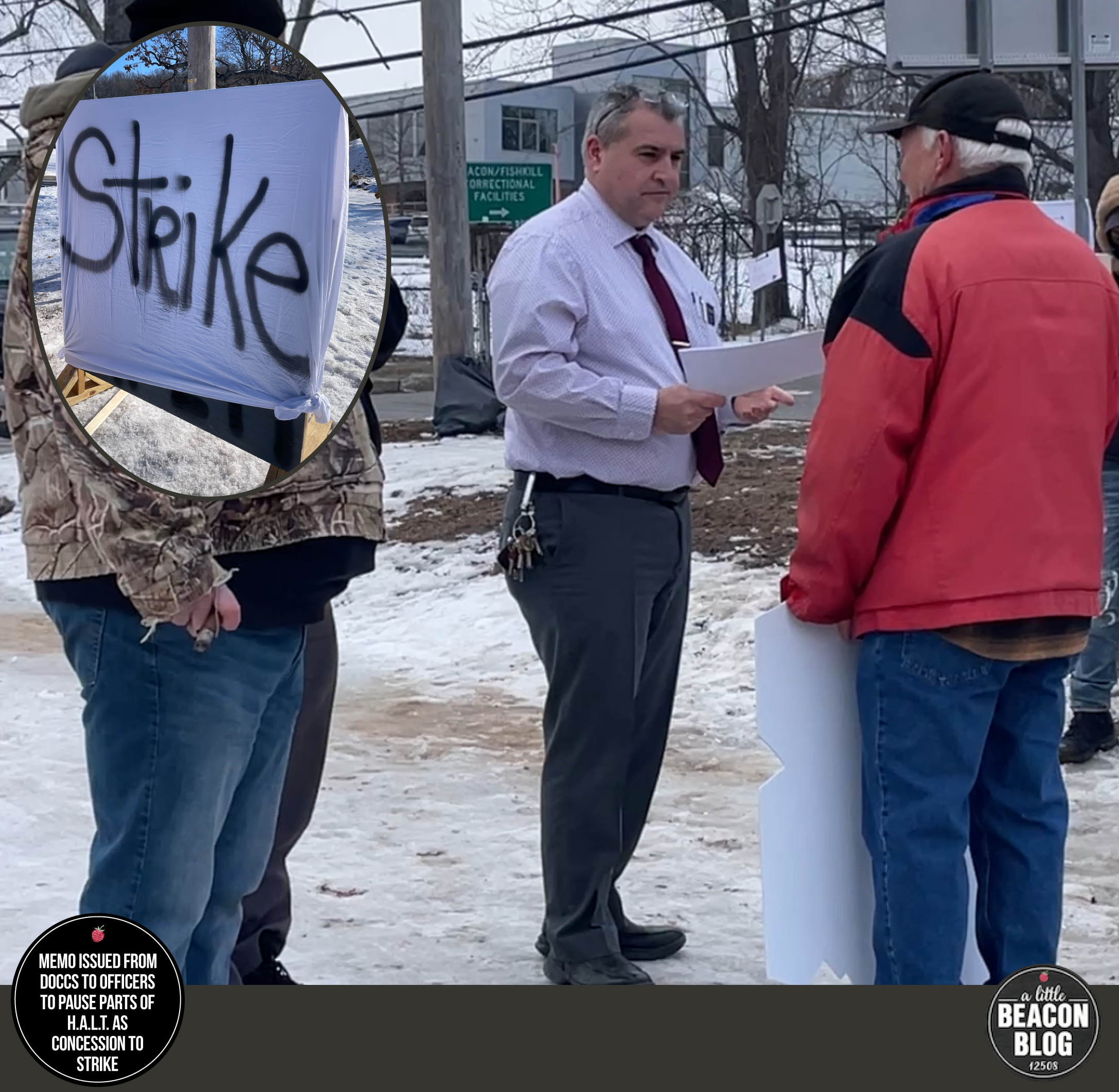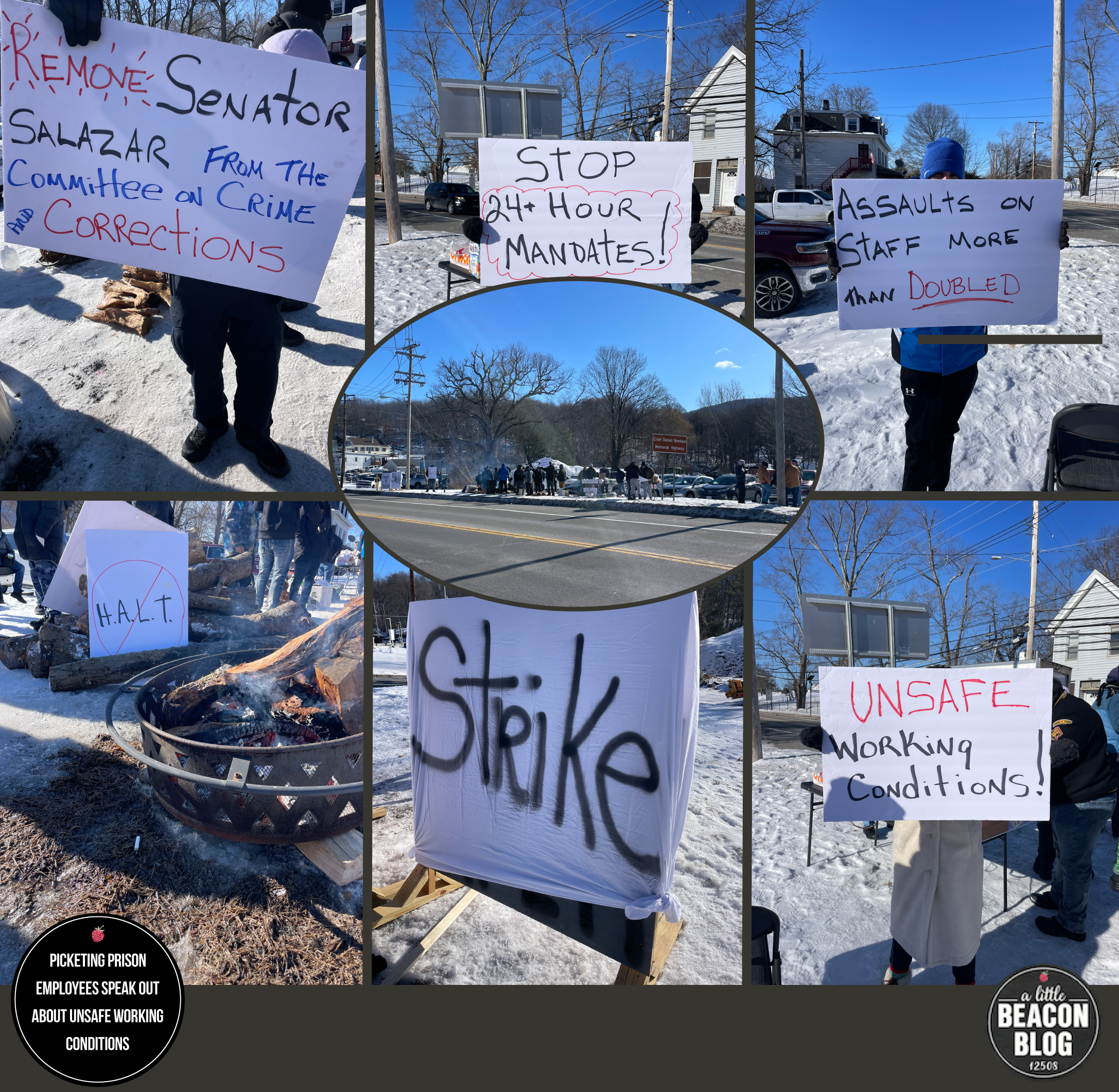DOCCS Terminates Corrections Officers Who Are Striking Calling It “Resignation” - Cuts Health Insurance, COBRA, and Salary Also
/A Corrections Officer holds a sign on Matteawan Road, which is the road to the Fishkill Correctional Facility and the Beacon High School and Middle Schools, that says: “No One Is Safe Inside.”
The Department of Corrections and Community Supervision (DOCCS) has followed through on its threat to fire Corrections Officers who are striking in the name of unsafe conditions for all people inside of the New York prison system: Corrections Officers, Incarcerated People, and Visitors. DOCCS has sent a letter of resignation to officers who are striking, according to the letter ALBB has seen and republished below.
The letter states that any officer who has not reported to work in 10 days is considered AWOL and has resigned. Corrections Officers were warned via robo-call (audio recording included below) on Sunday that their employment would be terminated, and health insurance would end for themselves and all of their dependents, as would eligibility for COBRA.
According to a source familiar with the situation, about 20 Corrections Officers from Fishkill Corrections Facility, located in Beacon, have received the letter.
However, inconsistencies occurred with the delivery of the letter, which was emailed and text messaged to select officers, despite saying that it was sent Certified Mail. If so, the paper copy has not arrived yet. Additionally, some retired Corrections Officers also received the employment termination letter, according to sources. “They’re not organized,” one officer told ALBB.
The names of terminated officers were not on each letter. “Nobody knows if this is even true, if they are really enforcing this or if it’s just another threat,” one officer who received the letter told ALBB. “As you can see, I got sent that letter, but my name is not on it.”
Governor Kathy Hochul has threatened to arrest Corrections Officers still on strike. According to The City, “the Hochul administration is also pushing to get permission from a state judge to begin arresting striking officers for breaking the law. That process is expected to take several days,” according to Jackie Bray, the Commissioner of Homeland Security and Emergency Services who spoke to reporters on Monday (3/3/2025).
The Letter of Termination Emailed To Corrections Officers On Strike,
And Some Retired Corrections Officers
March 2, 2025
CERTIFIED MAIL
RETURN RECEIPT REQUESTED
This is to confirm that your absence beginning on February 17, 2025 was unauthorized.
Section 14.10, Unauthorized Absence, of the 2023-2026 Agreement between the State of New York and New York State Correctional Officers & Police Benevolent Association, Inc. states, "Any employee absent from work without authorization for ten (10) consecutive workdays shall be deemed to have resigned from his position if he has not provided a satisfactory explanation for such absence on or before the eleventh (11th) workday following the commencement of such unauthorized absence."
You did not provide a satisfactory explanation for this absence on or before March 2, 2025, the eleventh workday following the commencement of your unauthorized absence. Therefore, you are deemed to have resigned from your position of Correction Officer with the New York State Department of Corrections and Community Supervision. Accordingly, you are separated from employment with an effective date of March 2, 2025.
Please make immediate arrangements to return all Department equipment to the Correctional Facility. Failure to comply with this direction may result in the withholding of any monies due you, as well as possible legal action being instituted against you.
This termination revokes your Peace Officer status granted under Section 2.10 of the Criminal Procedures Law*. If you possess a firearm(s) by virtue of your peace officer status, you must make arrangements to surrender the firearm(s) at a local law enforcement agency. DO NOT BRING YOUR FIREARM(S) TO ANY NYS DOCCS FACILITY.
Sincerely,
Daniel F. Martuscello III
Commissioner
cc: Personal/Labor Relations
NYSCOPBA
*2.10 Persons designated as peace officers.25. Officials, as designated by the commissioner of the department of corrections and community supervision pursuant to rules of the department, and correction officers of any state correctional facility or any penal correctional institution.
The Harriman State Campus, 1220 Washington Avenue, Albany, NY 12226-2050 | (518) 457-8126


































































